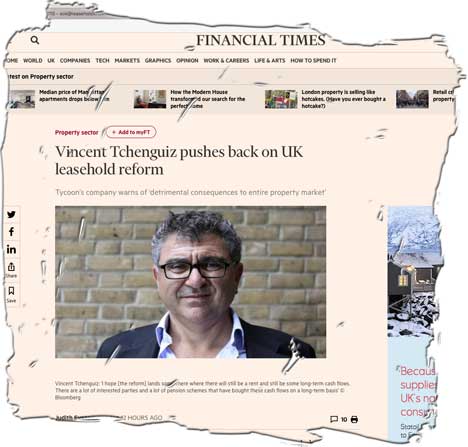
In today’s Financial Times interview, Vincent Tchenguiz says the sale of his Fairhold Securitisation Limited has collapsed because of buyers’ concerns over government reforms to leasehold.
Vincent Tchenguiz pushes back on UK leasehold reform
Property tycoon Vincent Tchenguiz is lobbying against proposed changes to the leasehold system that his company says threaten “unintended detrimental consequences to the entire property market”. Mr Tchenguiz, whose Consensus Business Group is one of the largest holders of UK freeholds, told the Financial Times there were “grounds to keep the freehold-leasehold system working” despite a scandal over escalating ground rents.
But in 2015 Moody’s downgraded the securitization, based on ground rents and other incomes in residential freeholds in the retirement sector.
While Moody’s recognised “the very good quality and predictability of the cash flows derived from ground rents”, it noted:
“The loan’s repayment relies on the receipt of ground rent payments, warden’s apartments rents and transfer fees arising from freehold and long leasehold reversionary interests in 406 sheltered housing developments (the “Portfolio”) owned by thirteen property owning subsidiaries of the Borrower. The portfolio’s cash flows relate to 18,678 sheltered housing apartments and 310 warden’s apartments located in town centers throughout the United Kingdom.
“The transaction has been performing well with no issues to date. Therefore, the very high default probability of the loan is principally due to the refinancing risk when the loan reaches maturity in October 2015 and as such the default risk of the notes is concentrated in the period between the loan maturity date and note maturity date in 2017.
“Moody’s is aware that ground rent portfolios are potentially attractive to certain type of investors, in particular those looking for exposure to long-dated, inflation-linked cash flows. Despite this, Moody’s believes that ground rent portfolios are still a relatively niche asset class, and as such the market is still neither particularly deep nor are ground rent portfolios apparently liquid. This, combined with the challenging hedging structure caused Moody’s to further revise its refinancing outlook for the underlying loan to incorporate a very high probability of default at the loan’s maturity date.
“The other driver of the ratings is Moody’s valuation. The portfolio valuation supplied in the investor reporting follows an actuarial approach. There is doubt in Moody’s view whether a buyer of the portfolio would purchase solely based on an actuarial valuation, given the uncertainty around projecting very long-dated cash flows. Market comparables to date have indicated that a yield-based approach would be used to value similar portfolios.”
In the Financial Times, Mr Tchenguiz says reform of leasehold could have “unintended detrimental consequences” such as pension funds forced to write down loans – and higher home prices.
This nonsense was debunked by Persimmon here:
Mr Tchenguiz also warned against commonhold saying: “There is complexity in commonhold, with multiple parties trying to run a building, especially if you have a building with 300 tenants.”
Complexity is not an unfamiliar concept to the interests of the Tchenguiz Family Trust, based in the British Virgin Islands, with one judge describing the company structure as “quasi-Biblical”:
Leaseholders in retirement flats, in Huddersfield terraces and prime London riverside apartments may also be surprised to see Mr Tchenguiz raising an “ethical concern” over lenders such as pension funds being forced to write down loans.
The FT article also quotes William Kenneth “Bill” Procter, chief executive of Mr Tchenguiz’s Consensus Business Group residential division – who appears in the Panama Papers in his own right – telling the Communities Select Committee that the limiting of ground rents would mean “freeholds will be of no interest to investors . . . and developers’ existing business models will have to be adjusted, potentially leading to higher prices for homebuyers”.
https://www.ft.com/content/79be0434-03ab-11e9-99df-6183d3002ee1
Mr Tchenguiz also tells the FT that it is unreasonable for the government to expect freehold speculators such as himself to pay millions to remove Grenfell cladding from private sites when “sometimes on a block we could be collecting a total of £10,000 of rent [annually]”.
“The cladding issue we believe is the responsibility of either the government or the [leaseholder] residents,” he said.
LKP does not entirely disagree, although we would say it is the responsibility of either building regulators or the developers and their warranty providers who built the buildings.
But financiers speculating in ground rents are not the beneficial long term custodians of buildings, they are simply the purchasers of its hopefully-soon-to-be-terminated income streams.
There is no prospect at all of these usually privately equity operators paying out, and the courts have so far ruled that they should not do so: Mr Tchenguiz, for example, at Citiscape in Croydon.
One omission from the Financial Times article is the Rothesay Life debenture on the Tchenguiz ground rent incomes, which means that Mr Tchenguiz himself is having to rely on the consent fee incomes in leasehold to service his loans.
Here is an example of one consent fee that was reconsidered after the intervention of LKP:
Curiously, the ground rent funds Long Harbour and Wallace Partnership Group are remunerated in the same way. They buy residential freeholds for private equity interests (and possibly some pension funds), which receive the ground rents, while they receive the more questionable consent fee incomes from the leaseholders.
So charging an old lady £80 to keep a cat is an important part of the business.
And here are a few others, courtesy of retired leaseholder Charles Willis:
Registration Of:
*New owner-£125.00
*Remortgage-£125.00
*Land Registry if consent is required – £205.00
Renting out Flat:
*Registering new tenant for letting your property-£130.00
*Renewal of a new tenant for Letting your property-£65.00
*Written confirmation letting not required-£70.00
Selling Flat:
*Welcome Pack when selling your Flat-£135.00
*Permission/Consent to sell your property-£175.00
Consent for Pets:
*Pets-£80.00
Consent Major Works-£395.00
*Removal walls
*Build Conservatory
*Porch extension
*Parking bollard
*Driveways
*Stair lift
*Solar Panels
Consent Minor Works-£195.00
*Wooden flooring
*Window replacements
*Gas central heating
*Relocation of Boiler/Flue
*Bath/shower conversion
*Satellite Dish
*Stud Walls
*Fencing
*Sheds
General fees:
*Statement Ground Rent-£65.00
*Purchasing copy of your lease-£185.00





 Farewell to newbuild leasehold houses?
Farewell to newbuild leasehold houses?






















Indebted Tchenguiz`s argument regarding common hold is counter-intuitive.
If he claims leasehold is needed to be the guardian of a building and common hold would fail to do that (unlike the ROTW who seem to manage buildings perfectly adequately) then just owning the freehold as an asset for income, does not make you the building owner.
Therefore, why should a company with minor financial investment in the building as he claims, have the monopoly over the say in the building maintenance? Surely, that choice should be with the major investors in the building – the leaseholders. Another flaw in the leasehold argument.
They are guardians when it comes to an income stream but not when faced with repairing an unsafe clad building – which is the legal obligation under The Building Act 1984 for a freeholde of the building. Whether the fault lies with developers, government regulations or local authorities for cladding issues, nonetheless, the freeholder is recognised as the building owner and should foot the repair bill. It will be up to them to pursue any other party through the courts for reimbursement. No rights without responsibility.
So, if it is established that the freeholder is indeed the building owner then they should pay for cladding removal. Alternatively, if they are not considered building owner, but just an asset investor, then the management of the building should be the remit of the leaseholders to appoint their own service management company.
Very good points, and well expressed.